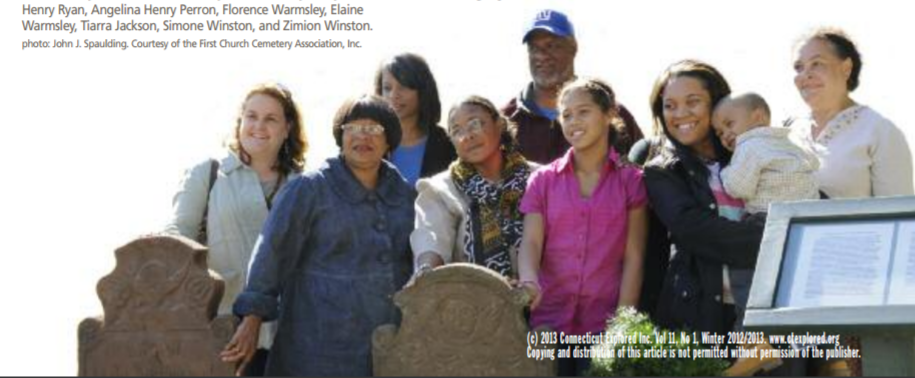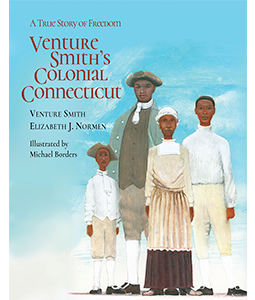by Gene Leach
(c) Connecticut Explored Inc. WINTER 2012/13
Subscribe/Buy the Issue!
 Born in West Africa around 1729, Venture Smith was no more than seven when he was seized and sold into slavery in Rhode Island. Traded from master to master, and sold from an owner in Rhode Island to one in Connecticut in 1754, Venture married, had children, and ceaselessly strived to attain his freedom. When his last owner permitted him to hire himself out and keep part of his earnings, Venture labored ferociously for five years before “buying” himself in 1765. In freedom his prodigious energy and entrepreneurial zeal gained him a good deal of property, the respect of many neighbors, and finally the chance, in accord with his “earnest desire,” to record his story. With a schoolteacher serving as scribe (Venture was illiterate) and the New London Bee as publisher, Venture’s Narrative of his African origins, his bondage, his self-emancipation, and the uses he made of his liberty appeared in 1798. It is an extremely rare document, one of the earliest of all American slave narratives and one of very few accounts left by an American slave born in Africa. All told, five Connecticut slaves published their stories; Venture’s Narrative preceded the others by several decades.
Born in West Africa around 1729, Venture Smith was no more than seven when he was seized and sold into slavery in Rhode Island. Traded from master to master, and sold from an owner in Rhode Island to one in Connecticut in 1754, Venture married, had children, and ceaselessly strived to attain his freedom. When his last owner permitted him to hire himself out and keep part of his earnings, Venture labored ferociously for five years before “buying” himself in 1765. In freedom his prodigious energy and entrepreneurial zeal gained him a good deal of property, the respect of many neighbors, and finally the chance, in accord with his “earnest desire,” to record his story. With a schoolteacher serving as scribe (Venture was illiterate) and the New London Bee as publisher, Venture’s Narrative of his African origins, his bondage, his self-emancipation, and the uses he made of his liberty appeared in 1798. It is an extremely rare document, one of the earliest of all American slave narratives and one of very few accounts left by an American slave born in Africa. All told, five Connecticut slaves published their stories; Venture’s Narrative preceded the others by several decades.
Venture’s son Cuff fought in the Revolutionary War, a striking fact he omitted from his Narrative. There was bad blood between father and son, but the omission also suggests the Revolution’s irrelevance to Venture. By his own efforts he secured freedom for himself, his family, and several other black people many years before the Revolution spurred the Connecticut Assembly to initiate a long process of gradual emancipation in 1784. When Venture died in 1805 several hundred people remained enslaved in Connecticut, and some Connecticans continued to profit from the odious trade. The Narrative makes no argument for abolition because the abolitionist movement—which sponsored the great majority of later slave narratives—did not yet exist when Venture spoke out. He felt, and was, on his own.
Exile and virtue unrewarded are the binding themes of the life Venture recounts. His native good character and passion to improve himself, which he credits to his African heritage, were things that Americans professed to love, yet he spent almost half his American sojourn in bondage. But by publishing his Narrative Venture Smith got the last word. Most readers would have preferred a saga of his adventures only. Anti-slavery advocates would have wanted more moralizing, more propaganda. Venture produced instead a work more precious because more true, a “Life” with its “griefs and pains” defiantly left in.
[c. 1736]…All of us were then put into the castle and kept for market. On a certain time, I and other prisoners were put on board a canoe, under our master, and rowed away to a vessel belonging to Rhode Island…. I was bought on board by one Robertson Mumford, a steward of said vessel, for four gallons of rum and a piece of calico, and called VENTURE on account of his having purchased me with his own private venture. Thus I came by my name.
[c. 1765]…I hired myself out at Fisher’s Island, earning twenty pounds: thirteen pounds six shillings of which my master drew for the privilege and the remainder I paid for my freedom. This made fifty-one pounds two shillings which I paid him. In October following I went and corded four hundred cords of wood, besides threshing out seventy-five bushels of grain, and received of my wages down only twenty pounds, which left remaining a larger sum…. Being thirty-six years old, I left Colonel Smith once more for all. I had already been sold three different times, made considerable money with seemingly nothing to derive it from, had been cheated out of a large sum of money, lost much by misfortune, and paid an enormous sum for my freedom….
…I met with another loss … by no less wicked means…. One hogshead of the molasses had been lost overboard by the people attempting to land in on the wharf. Although I was absent at the time … I was nevertheless prosecuted by this conscientious gentleman … and obliged to pay upwards of ten pounds lawful money, with all the costs of court. I applied to several gentlemen for counsel in this affair, and they advised me … to pay the sum and submit to the injury, which I accordingly did, and he has often since insultingly taunted me with my unmerited misfortune. Such a proceeding as this committed on a defenceless [sic]stranger, almost worn out in the hard service of the world, without any foundation in reason or justice, whatever it may be called in a Christian land, would in my native country have been branded as a crime equal to highway robbery. But Captain Hart was a white gentleman, and I a poor African, therefore it was all right, and good enough for the black dog.
…But amidst all my griefs and pains, I have many consolations: Meg, the wife of my youth, whom I married for love and bought with my money, is still alive. My freedom is a privilege which nothing else can equal. Notwithstanding all the losses I have suffered by fire, by the injustice of knaves, by cruelty of my own countrymen whom I have assisted and redeemed from bondage, I am now possessed of more than one hundred acres of land, and three habitable dwelling houses. It gives me joy to think that I have and that I deserve so good a character, especially for truth and integrity.


